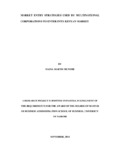| dc.description.abstract | In the current global market, many companies even the well-established multinational
companies are finding it hard to expand to foreign markets. A firm’s choice of mode
of entry into a foreign market is one of the most important decisions made by
international managers. The entry mode chosen affects the amount of control the firm
will have on its business activities abroad. A firm can set up an entry to a foreign
market in only two ways, it export its products to a foreign market or it can transfer its
resources such as technology, capital, know-how, brand name to a foreign market in
which those resources can be sold directly to customers or combined with resource in
the host country to manufacture product for that market. Entering new markets,
despite the huge potential that it provides, does involve big risks. Foreign market
entry mode is an institutional arrangement that makes possible the entry of a firm’s
products, service, know-how, management and other resources into a foreign market.
The study recommends that the multinationals Corporations (MNCs) should critically
analyze the various strategies at their disposal in entering a new market before making
decisions on how to enter the selected market. The study also recommends that MNCs
should consider the advantages and disadvantages the different strategies before
selecting on a given strategy. They need to assess the options available for their
market entry and be able to select the strategy with more advantages and one that will
ensure successful market entry and acceptability by the local market regulators. The
study recommends that further research should be done on the foreign market entry
strategies adopted by Multinational corporations including other banks in the Kenyan
market to allow for generalization of foreign market entry strategies adopted by
MNCs in Kenya since each employs a different market entry strategy. Descriptive
research technique was used in the study which enables description of the phenomena
being studied this is due to the large number of multinationals in the country. Simple
random sampling technique was used in the study to pick the sample for study. The
collected data was coded and analyzed using descriptive statistic and Statistical
Package for Social Sciences (SPSS). Majority of the multinational firms operating in
Kenya have been in Kenya for over 15 years that has been attributed to ties with
former colonial master. The good working relations with the western countries have
seen the entry of the foreign countries into Kenya looking for markets for their goods
and services. Majority of the multinational firms in Kenya are attributable to the fact
that a majority of the firms have operations in other countries. It is therefore
recommended that examination into more market entry strategies be done as the
strategies are very important for the success of the multinational in the local market. | en_US |

